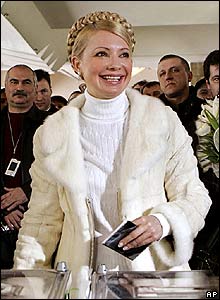
Will Tymoshenko Unite Ukrainian Opposition?
Publication: Eurasia Daily Monitor Volume: 7 Issue: 58
By:

Yulia Tymoshenko has found herself in the opposition after losing the February 7 presidential election runoff to Viktor Yanukovych. Her coalition in parliament has ceased to exist, and on March 3 a new pro-Yanukovych majority dismissed her from the post of prime minister. Although Tymoshenko headed the opposition in 2006-2007, when Yanukovych was prime minister, and she undoubtedly remains the most popular opposition politician, Tymoshenko faces an uphill struggle in her efforts to consolidate the opposition. Several prominent opposition figures dispute her leadership credentials. Nationalist parties recently organized a consolidated attack against Education Minister, Dmytro Tabachnyk, demanding his dismissal. This may become the starting point for a consolidation process.
Tymoshenko declared the goal of uniting “the real democratic national-patriotic forces” at a briefing on March 2. She listed the consolidation of Ukrainian independence, continuation of a pro-European course, and fighting corruption as the main tasks around which the opposition should unite (Ukrainska Pravda, March 2). At a nationalist rally on March 9, Tymoshenko’s allies proclaimed her the leader of a unified democratic opposition. However, the rally was ignored by such prominent oppositionists as former President Viktor Yushchenko and former Parliamentary Speaker Arseny Yatsenyuk, making it clear that Tymoshenko will need to make more effort to actually unify the opposition (UNIAN, March 9).
On March 17, Tymoshenko’s bloc (BYT) and several groups from the Our Ukraine –People’s Self-Defense caucus (NUNS), which is the third largest caucus in parliament after Yanukovych’s and Tymoshenko’s, signed a statement pledging to set up a unified opposition in parliament and began to form a shadow cabinet (www.for-ua.com, March 17). However, the majority of NUNS refused to join Tymoshenko, so the shadow prime minister designate, BYT deputy Serhy Sobolev, admitted in a recent interview that currently the opposition in parliament de jure consists only of BYT deputies (www.glavred.info, March 22).
Yatsenyuk, a member of NUNS, who came in fourth in the first round of the presidential elections on January 17, made it clear that he would not join the opposition camp forged by Tymoshenko. He said he would organize his own shadow cabinet. According to Yatsenyuk, there is no place for a unified opposition in a multi-party system. Yatsenyuk said that by proclaiming a unified opposition, Tymoshenko wanted to secure the right to appoint her people to chair several parliamentary committees, which are on the opposition’s quota (Kommersant-Ukraine, March 17). NUNS’ formal leader, Mykola Martynenko, also said that his caucus would not participate in Sobolev’s opposition government. NUNS would not become BYT’s junior partner, he said (Interfax-Ukraine, March 19).
Yushchenko, who did a lot to spoil Tymoshenko’s election campaign, will not help Tymoshenko in her current endeavors. He and his ally, Vyacheslav Kyrylenko, one of the leaders of NUNS, will probably form their own opposition camp. Ihor Popov, a former deputy head of Yushchenko’s office, suggested that the opposition would not be unified, because it consists of “parties and personalities that have been in a state of war between each other for years” (www.for-ua, March 17). As the underdog throughout the presidential campaign, Tymoshenko could have started to build bridges with future opposition partners long before her expected defeat. But this did not happen. There was no plan B, because Tymoshenko thought only about a victory, her right-hand man, Oleksandr Turchynov, revealed in an interview with Zerkalo Nedeli on March 20. The lack of strategic planning several months ago now slows the consolidation of the opposition.
A common goal might make consolidation easier. Apparently, the only goal that opposition parties jointly pursue at the moment is the dismissal of the Education Minister, Dmytro Tabachnyk. He does not share the official views on history and language issues and he has fiercely opposed Yushchenko’s policy of forging a monocultural and monolingual nation state. Tabachnyk is reportedly backed by Moscow. This, and the fact that several prominent figures in Yanukovych’s team, including Yanukovych’s humanitarian aide, Hanna Herman, and Deputy Prime Minister, Borys Kolesnykov, openly dislike him, makes Tabachnyk an easy target for the nationally-minded opposition. However, the BYT joined the anti-Tabachnyk campaign only after it was launched by nationalist grassroots not directly linked to the BYT, which has further undermined Tymoshenko’s credentials to unite the opposition.
Kyrylenko submitted to parliament a draft no-confidence motion against Tabachnyk as early as March 12, the day after Tabachnyk’s appointment. A number of nationalist student groups organized rallies against Tabachnyk across Ukraine on March 14-15, and the western Ivano-Frankivsk regional council demanded Tabachnyk’s dismissal on March 15 (Ukrainska Pravda, UNIAN, March 12-15). The BYT caucus publicly joined the campaign only on March 16, calling for Tabachnyk’s dismissal and claiming that he was appointed as a minister at the Kremlin’s request (www.tymoshenko.ua, March 16). Tabachnyk dismissed the campaign against him as a “witch hunt” and said he would not resign (Interfax-Ukraine, March 17). If Tabachnyk could be ousted it would be a small, but real victory for a new unified opposition.




